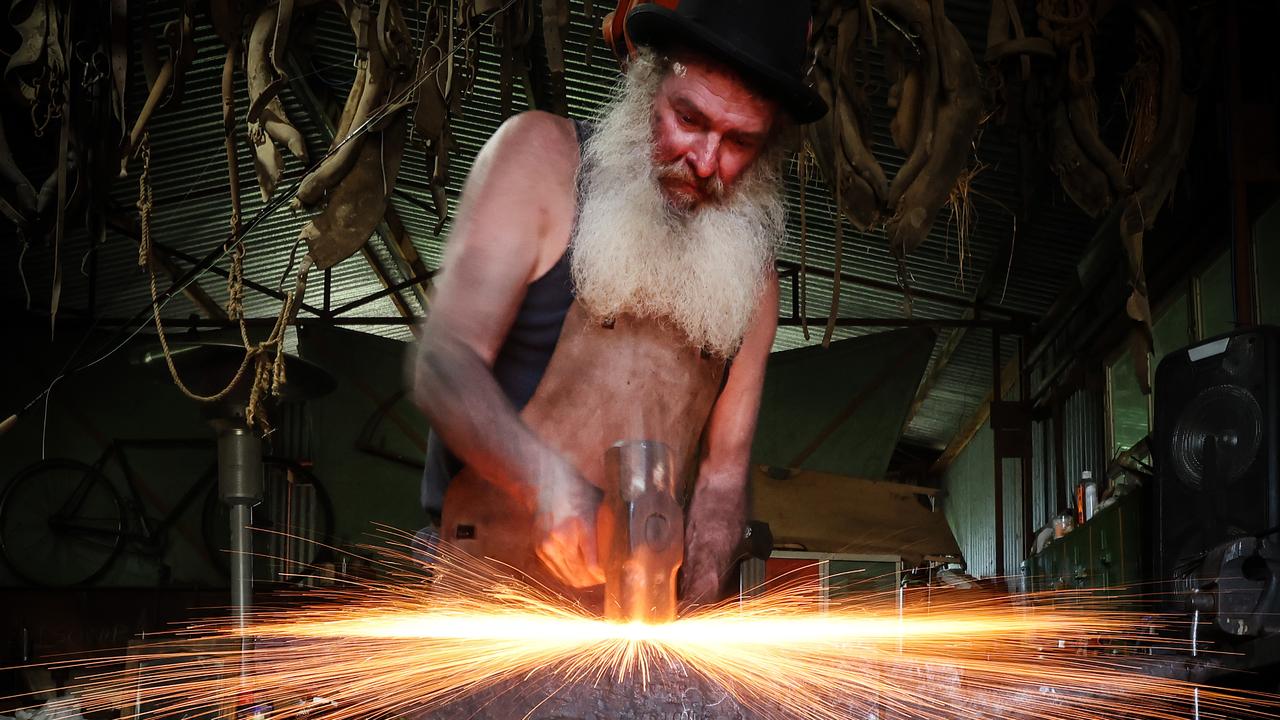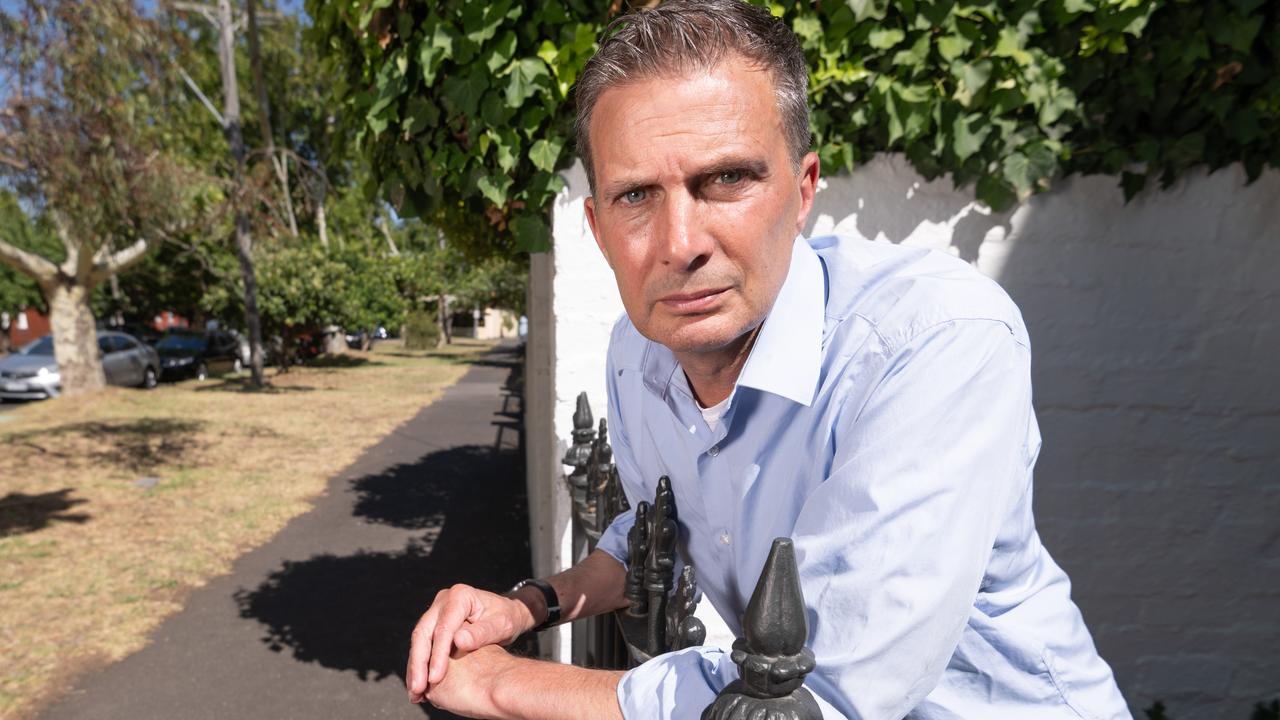Hamish McLachlan: How Jamie Kah became Australia’s best jockey
Jamie Kah had a rocky race for the record books when a young horse threw her off on the morning she rode for glory.
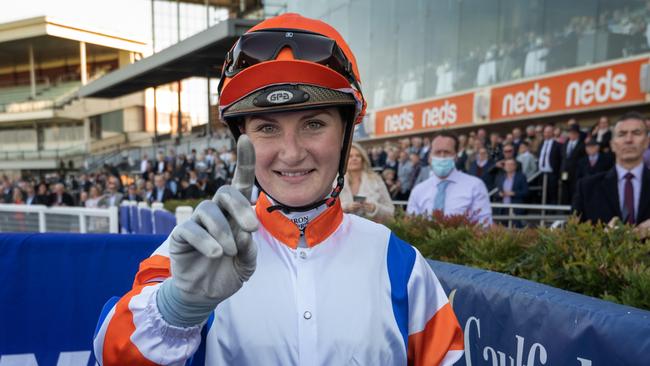
Victoria
Don't miss out on the headlines from Victoria. Followed categories will be added to My News.
Jamie Kah grew up in a small country town in South Australia. She was on horses before she could talk, and learnt to ride at the local pony club. A fortnight ago, Jamie did what no one had done before in Victoria, riding 100 Metropolitan winners in a racing season. In doing so, she went past the record of 99.5 set by Brett Prebble. People used to say Jamie was “a good female jockey”. Now they say she is one of the best jockeys in the world.
HM: Jamie, are you sick of talking about Jamie?
JK: I’m definitely sick of seeing my face everywhere! I’m not a fan of talking about myself either.
HM: Let’s go back a little. Mount Pleasant – population 260 or so – on the edge of the Barossa Valley. Sounds like a nice town.
JK: You know it is – it’s your home town too! It’s a beautiful town! That’s where it all started for me, the Mount Pleasant Pony Club. You and your brothers were a few years before!
HM: Just a few …
JK: It’s where I learnt how to ride, and where I found my love for horses. I competed in a few state championships with Mount Pleasant, and they lead to nationals and then the Mounted Games world championships. It’s a very special town.
HM: A great town. We will get to you in a moment, but first your parents. John and Karen? How do they end up ice skating, at a Winter Olympics?
JK: My grandfather owned the Thebarton ice skating rink … you’ve probably been there?
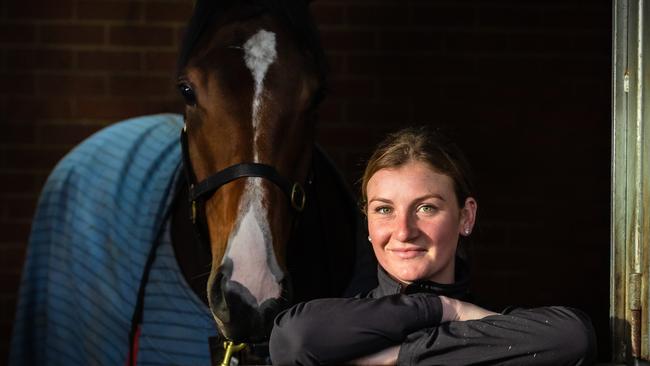
HM: When I was at boarding school in Adelaide, that was the excursion we all wanted to do on the weekends and meet girls from other boarding houses. I think I knocked myself out there once!
JK: You’re not the first! But that’s how it all started. Dad is half Dutch, and his father used to ice skate in Holland. In 1991, Dad won the 5000m relay at the world championships in Sydney, which was the first time that Australia had won a world championship in a winter sport. I come from a long line of ice skaters!
HM: Is it true one of them taught Steven Bradbury to skate?
JK: Well, Mum taught Dad how to skate, because she’s eight years older than him. When they made the world championships team, Dad used to give Steven Bradbury lessons. Small world, ice skating!
HM: Has your parents’ experience in professional sport helped you?
JK: In a huge way. When I was 14 and couldn’t get myself to trackwork, Mum would wake up at crazy hours of the morning just to take me. Her background in sport meant she knew what was needed. She knew the sacrifices needed because she’d been around professional sport, and my parents have always been fit and healthy people, which has set a huge example for me. Above all, they taught me that you don’t get anywhere in life without working hard. That’s certainly how they succeeded in sport but it’s also how we live our lives.
HM: They were obviously very athletic. Do they both ride well themselves?
JK: They do! Mum will say otherwise – she doesn’t think she is a very good rider. Mum and Dad were taught campdrafting and western riding in their late 30s. Dad is very natural and very balanced. He actually competed in the Mounted Games with me. He is a speed demon – not a lot of control, but he likes going fast!
HM: Explain the Mounted Games to the readers.
JK: I’ll try – it’s quite hard to explain. There are 30 or so different games, little relay races that are run in different sessions. With the pony club games, you have to swap onto a different horse each race. Each race you will be on a horse you’ve never ridden before. Some of the races include the bending race, vaulting races, and ball and cone races. You jump on and off, pick up tennis balls off the ground and put them on cones. There’s a lot of agility involved, and each game goes for a few minutes. It’s a really great sport to teach young kids how to ride. It’s fun, and you don’t need to be terribly technical, which can turn kids off riding. I did that from 10 until I was 16.
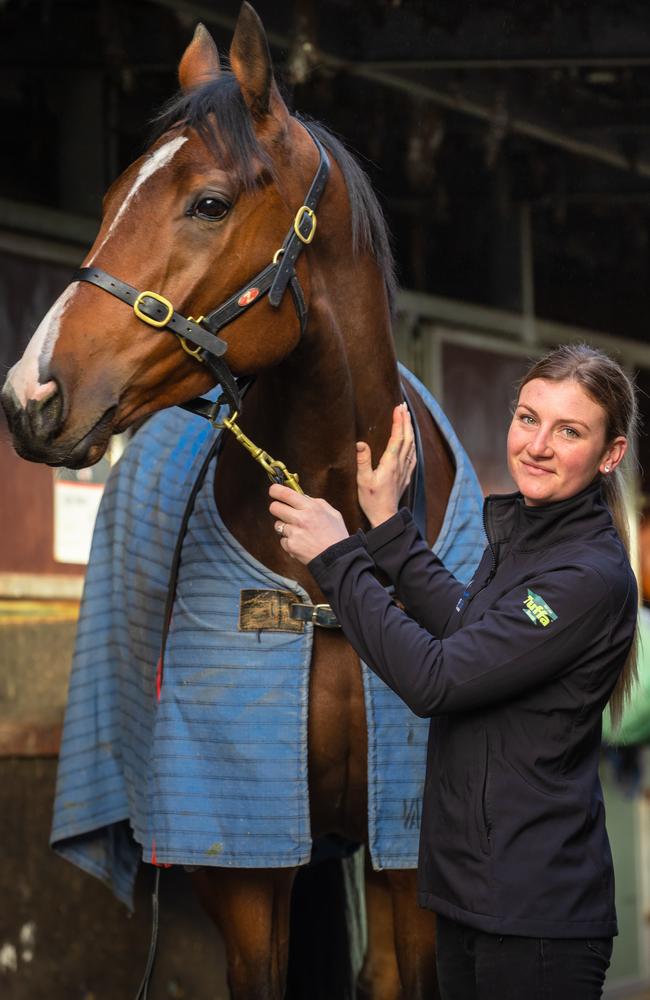
HM: You went to Britain at 14, as the youngest of five riders representing Australia. It’s very early to be jumping on a plane and competing internationally in any sport.
JK: That was one of the best periods of my life, getting to go overseas with a team of friends, and meeting some international riders. I would have ridden 40 different ponies over there. That’s great as a young rider, to just let the horses teach you. We came second overall.
HM: Some people who haven’t been around horses look comfortable with them. There are others where it looks like they are trying to read Latin when they’ve never learnt it. Yours first boss, trainer John MacMillan, said you were like Mozart with a piano. Everything just seemed natural. Was that how it felt to you?
JK: I always felt at home with horses. And they seemed to like me. There was never any friction between horses and me. Or any fear of each other. John was the best boss anyone could have asked for. He let me make mistakes and let me find my own way in racing. Being confident on a horse, and having balance, are the most important lessons. Things come relatively easily after that.
HM: Do you remember the first horse you rode?
JK: I had a lot of Shetland ponies. I remember jumping on a horse, and it took off and ran through a fence. I had cuts everywhere, but I couldn’t tell Mum … I told her I fell over in the garden. Mum would always find me out there sleeping with them. She couldn’t keep me away!
HM: Whose decision was it to go to John MacMillan and work in his racing stable before school?
JK: One of my good friends at the time, Melissa Andrews. She competed in mounted games with me and worked for John as his foreman. Melissa told me to come and work some afternoons and earn some pocket money to pay for new rugs and saddles for my ponies. I did two afternoons before I told Mum I wanted to be a jockey. It didn’t take long!
HM: How old were you at that point?
JK: Fourteen – I was working after school feeding and picking up manure. Then I had my first gallop when I was 14 and never looked back.
HM: How long did you combine working and school before throwing school out the window?
JK: I was 15 when I said, “Mum, this really isn’t for me. I’m just wasting your money!” Mum and Dad agreed, and I went to work.
HM: I’ve seen you jump, I’ve seen you do mounted games activities and I’ve seen you ride a horse. If I said you could do anything this afternoon, which is it that you love doing most on a horse now?
JK: Show jumping. That’s my passion. I love how trustworthy a horse can be. They canter into the jump, and with all that power sail over with you. If they didn’t want to, you could never make them. But if you find one that trusts you – wow.
HM: You sound very passionate about it.
JK: I seriously love the jumping. Imagine being at the Olympics on the jumping team. With racing being very much a 24/7 industry, there’s just no time for me to pursue that right now. When I retire or have a chance to take a few months off, I’d love to get three or four horses, travel around Australia and go to every big jumping show.
HM: Go and camp at Edwina Tops-Alexander’s house.
JK: Her horse truck is probably fancier than my house! I’m looking forward to seeing her jump in Tokyo.
HM: It’s fancier than all of our houses. At what stage did you think this season that you might ride 100 winners?
JK: Only in the last month. Everyone was saying I’d get there easily months ago, but I didn’t think it was going to be that easy. When I rode five winners at Caulfield, that’s when I thought I might be able to give it a shake.
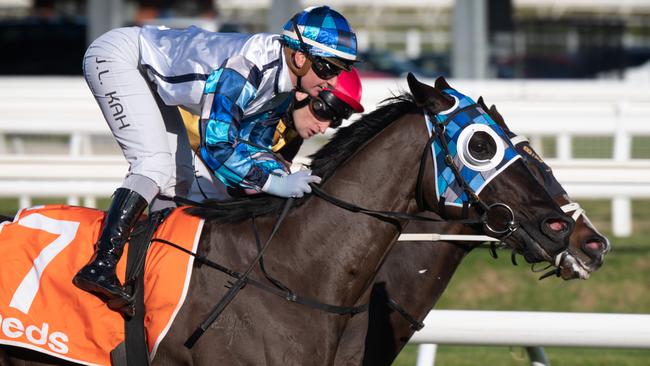
HM: As you got closer did you sense all eyes were on you? Did it feel a burden?
JK: It felt heavy in the end! I thought I was coping with it pretty well, and I wasn’t letting it get to me until that Sandown meeting when I needed one to get to 100. There was media everywhere! That day, I didn’t have a great book of rides, I thought, and I started to think about all the eyes on me after every race trotting back into the mounting yard. A lot of them became favourite just because of the hype around the record and me being on them. Leaving Sandown that day, I felt down and like I’d let people down – which is silly, I guess, but that was how I felt.
HM: You did something that no one has ever done before – 100 winners in a Metropolitan season. Incredible. Does it change anything for you?
JK: I’ve definitely had a lot more recognition than I though I’d get, and importantly, for me, for the first time in my career, I actually felt proud of myself. Richo (Jason Richardson) messaged me and told me what a massive achievement it was, and I replied to him: “I think I’m actually proud of myself for once”. For once, it’s not just a female record – this is a record no jockey has ever achieved. That’s pretty special.
HM: It’s incredible – particularly when racing has been going for a very long time in this country. Is it true you do very little form on races, you just jump on, get a feel for the horse, then a feel for the race, and ride accordingly?
JK: It is, yeah, which I know isn’t the norm. I’m not lazy, it’s just my way. Now that I’ve ridden most of the horses that I’m riding a few times, I know a lot about them, so I don’t feel like I need to go through lots of form before a race meeting. I know which horses to follow, the favourites, and how the horses like to sit in the race, but I don’t do a lot of form around where horses are likely to settle. After I jump out the gates, I have a quick look around to see how the horses have jumped and then assess – which jockeys are kicking up? Which jockeys are taking hold? I like to go out there with more of an open mind.
HM: We hear a lot about kids that have never ridden. They go to apprentice school, and they learn to ride. You’re different. You’ve done so much on a horse – dressage, show jumping, mounted games. Do you think those hours on horses gives you an edge?
JK: I definitely believe it helps. I would have ridden more than 300 horses before ever sitting on a racehorse, so I’d learnt how to ride a lot of different kinds of horses before ever thinking I was going to be a jockey. I try and let my horses jump as freely as they can, and just be happy. That gives you an advantage. If you’re already up in the first three or four, you can either take a sit, or let your horse work across – you’re not constantly chasing a horse trying to pick it up. You’re trying to make it as easy as you can for the horse.
HM: I’ve never known anyone to get a horse to be able to jump like you can.
JK: Sometimes it’s a curse …
HM: In what sense?
JK: Some trainers will tell me: “We just want you to ride this one a bit quietly today” or “Try and get some cover”. But I’ll sit on it, and it’ll jump out first!
HM: You are exceptional at jumping on a horse for the first time in the mounting yard, and knowing it well by the time you get to the barriers.
JK: Cantering down to the gate is the most crucial part. You find out if they’re a bit stiff on one side, if they don’t want to bend one way, if they want to get their head up, or if they’re relaxed and drop their head. You can read a lot from a horse in those first few minutes. Every horse is completely different, but you can read them very quickly. It’s not rocket science. You do get those horses that surprise you, and they jump out and want to get running when they’ve been really quiet and relaxed, but the majority of horses you can read very quickly.
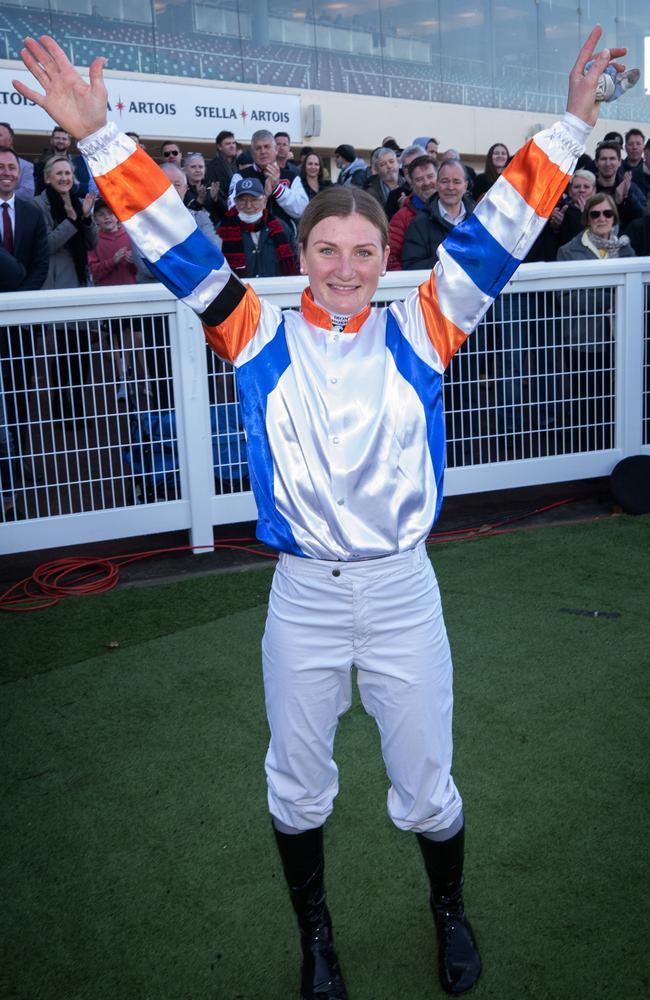
HM: Tell me why you think you are dominating some of the best jockeys in the world? The numbers speak for themselves.
JK: You’ve got to be lucky, and I’ve been extremely lucky. I’ve been put on some really nice horses, and fortunately, I’ve taken those opportunities and won on those horses. I’ve been on a roll since the start of the season when I had a handful of good rides. I’ve had some amazing supporters around me, big trainers – Mick Price, Tony McEvoy, the Freedmans. We’ve formed great relationships, and we work really well together now.
HM: Simplify it for me. I can get on the same horse as my wife, Soph, I can get the horse to travel very differently, and quicker than she can. What is it that allows you to get a horse to travel faster or to settle better? Hands? Balance? Combination?
JK: To me, it’s natural to get a horse to travel like that. We find in trackwork with a few of our riders, that sometimes a horse will be off the bit, and they can’t get it to travel, so I’ll jump on, and the horse will travel on the bit for me. I do carry my hands a lot higher than most jockeys. You get trainers or older jockeys that will yell at you: “Put your hands down!” I hate that. I hate putting my hands down. I like lifting the bit up in their mouth. I don’t know whether that helps them, but that’s just how I ride. I can’t tell you exactly why they travel well for me, but I am bloody glad they do!
HM: There aren’t many jockeys that I know that have broken in a horse post their career, let alone during it. I know you love the horse, but do you love getting a horse that’s never been sat on, and being the first on board?
JK: I do. I love it. I love that side of things at the moment with Clayton (fiance Clayton Douglas). It makes me so happy educating them and taking them out there for their first piece of work, knowing that you’ve put so much into them. There are good days and bad days with yearlings. I took a one of the naughtier fillies out the morning I rode my 100th, and I was dead set buried into the turf. She threw me and fell over on top of me!
HM: You came off a young one on the morning you rode your 100th!
JK: (laughs) I did. Clayton told me not to ride it, but I’m stubborn. I love working with and riding babies, yearlings … but on those bigger days, I should probably listen to Clayton’s advice.
HM: I tend to agree with Clayton! Is it true you get embarrassed when people ask you for an autograph?
JK: I do, it’s very new to me still. I get embarrassed in front of the jockeys that I ride against. I’ll be out there riding next to Craig Williams and Damien Oliver, and there are people yelling nice things over the rail at me, and not them! It makes me a bit embarrassed. It’s hard to fathom that people think I’m on the same level as them now.
HM: Well, they do. Because you are. There are kids wearing your silks to school when they have to go as their favourite superhero.
JK: I’ve seen that. It’s unbelievable. There are kids in the mounting yard holding signs up, yelling, “Go Jamie!” That’s just crazy to me.
HM: Crazy and cool. Tell us about the farm you and Clayton are building up.
JK: It’s a big part of my happiness and success this year. I always wanted to have horses around – that’s what makes me happy. Clayton is doing a great job with his little team of horses here. Every morning we get up and work them, and it keeps me fit and healthy. It’s something to look forward to post racing.
HM: And it likely keeps you fresh while you’re racing. You have an interest that isn’t just going around in circles. Your old man comes over and helps puts yards up, sheds up – it’s a constant project.
JK: Yes it is and yes, Dad and Mum have been incredible help. I put my off-the-track horses here, and even the horses that are racing at the moment. We jump them, school them, and do a lot of flat work with them. The jumping and dressage is something I’m very passionate about. I’d ride 10 to 12 horses a day. I haven’t had a big sweat at the races for a good 12 months now because I’m very active and keeping fit,
HM: I watched the Vega One with the Group 1 Kingsford Smith replay five times before we spoke today. I still don’t understand how you got that horse to win. Were you sitting out the back there thinking, “I’m in good shape?”
JK: No! I did think to myself that if he’s going to win today, he needs to be held up. He gets some amazing runs in races, but he pulls up and just doesn’t want to win. I wanted to be unlucky, but definitely not that unlucky. I had a nice run and it looked like it was opening up, but then McEvoy’s horse took out half the field, and Gytrash shuffled around and ruined my run. I had to go to plan B, plan C and then plan D. I always trusted my horse would have a lot to give when I asked him … and thank goodness he did! I managed to squeeze through the tiniest of gaps and win the race.
HM: Do you ever think about the dangers of it all?
JK: I don’t think you can really. We are all aware of the dangers, but the second you start thinking about them when you’re out there, that’s the second you need to stop doing it.
HM: Understand. You did walk away from the sport. Were you about 18 at the time? When Caitlin Forrest died after a fall?
JK: Yeah, it was a few months after she passed away. It was a build up of a lot of things. I could see my friends living their carefree lives, and they were all on their gap trips, travelling around Australia. It all just got to me. I was too young to deal with the pressure, so I took a gap year. Everyone said I was mad and I’d lose my way and not be able to get back into the sport. I went show jumping, and worked in a stable in Holland. It was time away that I definitely needed, but I couldn’t stay away. I ended up riding trackwork in Newmarket and a few places around England and fell in love with the sport again. I came back a much more mature person, and I haven’t looked back since.
HM: No one wins more than you do, but you get abused on social media. How do you avoid taking it on board?
JK: The best way to manage it is not to look. I don’t go on Facebook or Twitter anymore. People used to say, “Don’t read it, don’t read it”. But I did. Now I don’t. A few things have got to me. I’ve had an amazing year, no one could hope for a better year, and still, after Sandown, I copped the most horrible criticism. I’m a lot happier for staying off it.
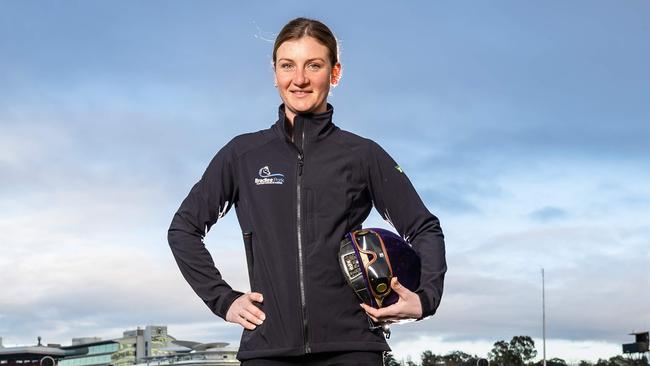
HM: I’m with you. The good is never good enough, and the bad posts affect you more than they should.
JK: You don’t need those people in your life, and I’m lucky I have some very great people around me.
HM: Your best ever individual ride, and why?
JK: My favourite ride still to this day is winning on Dollar for Dollar on Melbourne Cup Day. A lot of people know how special this horse is to me, and that day was just unbelievable. I hadn’t ridden in Melbourne much leading up to that day, and to hear the crowd roar like that, it felt like I won the Melbourne Cup. It gave me goosebumps. Nature Strip is also hard to go past.
HM: Last question. Olympic gold in show jumping in Paris 2024, or you can win the Melbourne Cup …
JK: Ahhhh … can I win both?
HM: You have to take one first.
JK: The first one is Melbourne Cup. But you know what? The race I want to win more –The Cox Plate.
HM: Really?
JK: Michelle won the Cup, which was amazing, but to ride in the Melbourne Cup was my dream. I’ve achieved that. I just love the Valley and that feeling around Cox Plate Day. It’s like no other. It would be a special race to win.
HM: Then once you’ve done that …
JK: Maybe I’ll go and win gold, Hame.



